Select Language
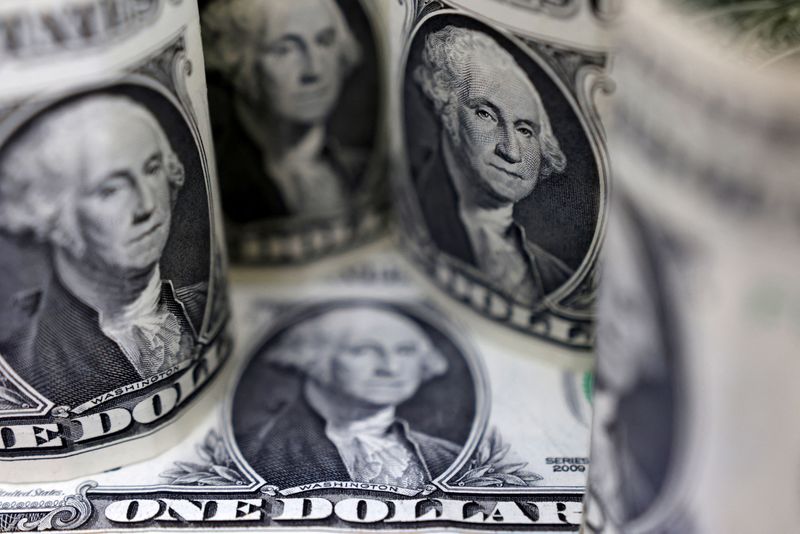
By Kevin Buckland
TOKYO (Reuters) - The dollar languished at its lowest since April against the euro and sterling on Tuesday as signs of a softening U.S. economy boosted the case for earlier Federal Reserve interest rate cuts.
The U.S. currency wallowed near a two-week trough to the yen after data showed a second straight month of slowdown in manufacturing activity and an unexpected decline in construction spending.
Following the data, fed funds futures increased the chances of a rate cut in September to around 59.1%, according to LSEG's rate probability app.
That compares with odds of around 55% on Friday, when data showed a stabilisation in consumer price pressures, helping knock the dollar to its first monthly loss of the year in May. Wagers were slightly below 50% earlier last week.
A key test comes in the form of monthly U.S. payroll figures on Friday.
"The persistent high-interest-rate policy of the Federal Reserve is under scrutiny as it continues to weigh on the U.S. economy," James Kniveton, senior corporate FX dealer at Convera, wrote in a client note. "Analysts are closely monitoring the upcoming job data for indications of economic strain."
Currently, a first quarter-point rate increase is fully priced by the Fed's November meeting, with a total of 41 basis points of tightening seen by year-end.
November "is poised to be a tumultuous period for the U.S. dollar due to the confluence of a potentially decisive Federal Reserve meeting and the U.S. elections," Kniveton said.
The Fed's next policy meeting concludes on June 12, when consumer price data is also due. Traders and analysts don't see any risk of a policy change at that gathering, but officials will update their economic and interest-rate projections.
The dollar index, which measures the currency against the euro, sterling, yen and three other major peers, eased 0.05% to 103.99, its lowest level since April 9.
The euro added 0.11% to $1.09155, a level last seen on March 21.
The European Central Bank has telegraphed that policy makers will cut rates at their meeting on Thursday, but a pick-up in inflation in data last week may give officials pause when considering when next to ease.
Sterling rose 0.05% to $1.2814, its strongest since March 14.
However, the dollar added 0.14% to 156.255 yen, clawing its way back from the overnight low of 155.95, its first time below 156 since May 21.
The Bank of England and Bank of Japan also hold potentially pivotal policy meetings later this month.
Elsewhere, the New Zealand dollar rose to $0.6194 for the first time since March 8. The Aussie traded flat at $0.66895, holding close to the two-week high of $0.6695 from overnight.

SEOUL (Reuters) - South Korea's consumer inflation slowed for a second straight month in May to a 10-month low, official data showed on Tuesday, coming in lower than market expectations.
The consumer price index (CPI) in May stood 2.7% higher than a year earlier, slower than a rise of 2.9% in April and a gain of 2.8% tipped in a Reuters survey of economists. It was the slowest annual increase since July.
The index rose 0.1% on a monthly basis, according to Statistics Korea, after no change in April and compared with a 0.2% rise expected by economists.
By product, prices of agricultural products fell 2.5% over the month, but petroleum products rose 0.3% and personal service prices gained 0.4%.
The Bank of Korea said last month inflation would likely be on a downward trend throughout the year despite stronger economic growth, because domestic demand was seen recovering only modestly.
The BOK, which held interest rates steady for an 11th straight meeting in May, is expected to lower its policy rate by 50 basis points (bps) to 3.0% in the fourth quarter of 2024, according to a Reuters poll in May.
Core CPI, excluding volatile food and energy items, rose 2.2% year-on-year, slowing from a 2.3% rise in the previous month and marking the slowest since December 2021.
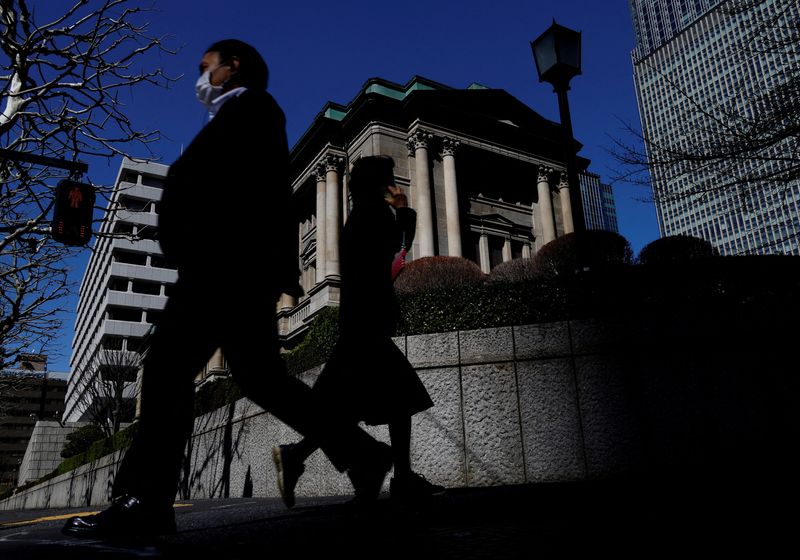
By Leika Kihara and Takahiko Wada
TOKYO (Reuters) - The Bank of Japan must steadily raise interest rates to guard against the risk of inflation accelerating well above its 2% target, said Takeo Hoshi, an academic with knowledge of the country's monetary policy.
Japan's wage-inflation dynamics are changing in ways unseen in the past with intensifying labour shortages pushing up labour costs and prodding more firms to hike prices, said Hoshi, an economics professor at the University of Tokyo.
Having ended a package of unconventional easing steps in March, the BOJ will keep raising rates to anchor inflation expectations around 2%, and eventually start quantitative tightening, Hoshi told Reuters in an interview on Friday.
"Unless the BOJ raises rates, inflation could accelerate too much. The kind of inflation seen in the U.S. and Europe could very much happen in Japan," said Hoshi, who has close ties with incumbent BOJ policymakers.
"There's a significant risk of inflation exceeding the BOJ's target. That's something the central bank should worry about from now on," he said.
Hoshi declined to say how soon the BOJ could raise its interest rate from current near-zero levels, but said hikes should happen "steadily" given upside risks to inflation.
"In deciding when to shift policy, the BOJ must also take into account how its U.S. and European counterparts move as that could affect asset prices including exchange rates," he said.
Hoshi participated in the BOJ's workshop held on May 21, which was part of a review of the pros and cons of its past unconventional monetary policy. He chaired a session that analysed Japan's economic and price developments.
The BOJ ended eight years of negative rates and a policy capping long-term borrowing costs around zero in March, making a historical shift away from its radical stimulus.
BOJ Governor Kazuo Ueda has said the central bank intends to hike rates to levels considered neutral to the economy, as long as growth and inflation move in line with projections.
Many market players expect the BOJ to raise rates sometime this year with some betting on action as soon as in July.
Expectations of a near-term rate hike pushed up the 10-year Japanese government bond yield to 1.10% on Thursday, the highest since July 2011. The benchmark yield stood at 1.065% on Friday.
Hoshi said the recent rise in 10-year yields was a "good sign" that showed the BOJ's decision to end its bond yield control was allowing yields to be driven more by market forces.
But the BOJ must be careful in communicating a strategy for slowing bond buying, and eventually selling bonds, as the huge size of its holdings could magnify the market impact, he said.
"One idea could be for the BOJ to communicate how it would unload its huge bond holdings in, say, 20 years. In doing so, it needs to remind markets that the plan isn't set in stone, and could change depending on circumstances," Hoshi said.
Japan's core inflation hit 2.2% in April, staying above the central bank's target for more than two years, as companies continued to pass on rising raw material costs to households.
The BOJ has stressed the need to keep interest rates low until inflation becomes driven more by sustained wage hikes and robust domestic demand. Ueda has also said inflation expectations are now around 1.5%, short of the BOJ's 2% target.
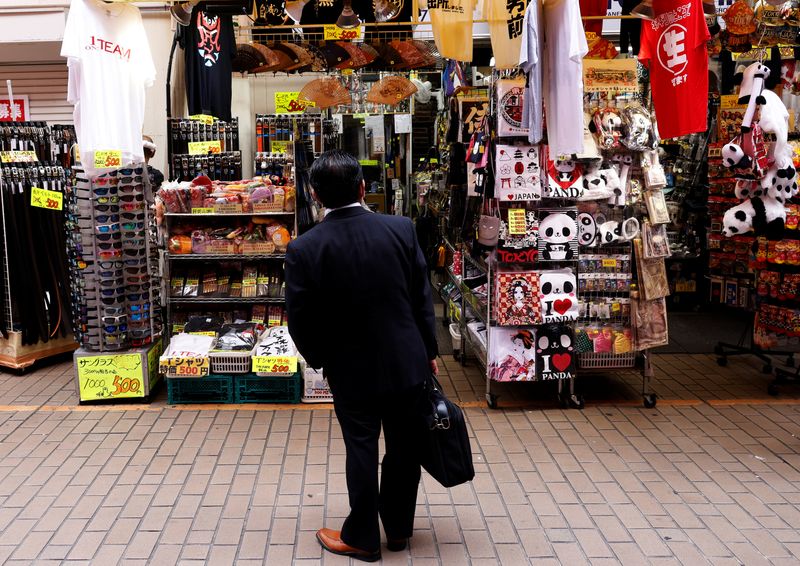
TOKYO (Reuters) - Japan is expected to post its first year-on-year rise in household spending in 14 months, a Reuters poll showed on Friday, although the tepid growth is likely to highlight persistent weakness in the consumer sector.
Spending probably rose 0.6% year-on-year in April, according to a Reuters poll of 17 economists, following a 1.2% decline in March. It would mark the first increase since February 2023.
On a seasonally-adjusted month-on-month basis, all household spending likely edged up 0.2% in April, slowing from a 1.2% increase in the previous month but posting a third straight monthly gain.
The households speeding data is due at 8:30 a.m. June 7/2330 GMT June 6.
"Considering the underlying price hikes, we can only judge consumption shows no sign of putting the brakes on worsening," said Takeshi Minami, chief economist at Norinchukin Research Institute.
"Although annual wage talks resulted in more than 5% wage hikes, households have not yet loosened the purse strings, so the pay raise has not helped boost consumption. The April spending data signals sluggish consumer spending."
Weak private consumption is a source of concern among policymakers striving to achieve sustainable economic growth accompanied by solid wages and durable inflation, which are prerequisites for normalising of monetary policy.
The Bank of Japan (BOJ) in March raised rates for the first time since 2007 in a landmark shift away from ultra easy monetary policy. Investors are seeking clues on exactly when the BOJ will raise interest rates further.
Japan's economy contracted 2% annualised in the first quarter as sharp yen declines pushed up costs and forced consumers to cut spending.
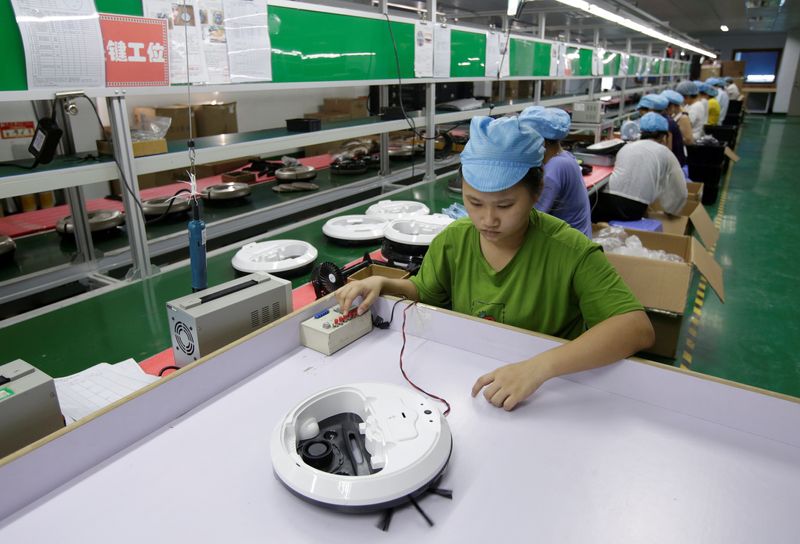
BEIJING (Reuters) - China's manufacturing activity unexpectedly fell in May, keeping alive calls for fresh stimulus as a protracted property crisis in the world's second-largest economy continues to weigh on business, consumer and investor confidence.
The official manufacturing purchasing managers' index (PMI) dropped to 49.5 in May from 50.4 in April, the National Bureau of Statistics (NBS) said on Friday, below the 50-mark separating growth from contraction and missing analysts' forecast of 50.4.
The disappointing number adds to a series of recent indicators showing the $18.6 trillion economy is struggling to get back on its feet, eroding earlier optimism seen after better-than-expected output and trade data.
"I think the data particularly reflects soft domestic demand, the housing sector continued to worsen and retail sales were not strong," said Xu Tianchen, senior economist at the Economist Intelligence Unit.
"The May reading may indicate a temporary blip. We'll probably see an improvement in June as new government policies start to impact, such as the property rescue plan and the issuance of special sovereign bonds," he added.
The PMI's sub-indices for new orders and new export orders both tipped back into contraction after two months of growth, while employment continued to shrink.
The services sub-index under the NBS non-manufacturing survey improved to 50.5 in May from 50.3 in April. But growth as represented by the broader services index, which also includes construction, slowed in May to 51.1 from 51.2 a month prior.
Problems in the property sector have had a negative impact across broad areas of China's economy and slowed Beijing's efforts to shift its growth model more towards domestic consumption from debt-fuelled investment.
Retail sales last month grew at their slowest since December 2022 while new home prices fell at their fastest rate in nine years, suggesting it is too early to say if the battered economy has finally turned a corner.
The International Monetary Fund on Wednesday revised up its China growth forecast by 0.4 percentage points to 5% for 2024 and 4.5% in 2025, but warned the property sector remained a key growth risk.
China this month unveiled "historic" steps to stabilise the property market, but analysts say the measures fall short of what is required for a sustainable recovery.
The IMF said it saw "scope for a more comprehensive policy package to address property sector issues."
Nie Wen, an economist at Shanghai Hwabao Trust, said the decline reinforced the case for more support.
"There is still a need to strengthen stimulus on the demand side, while at the same time sorting the credit channels as soon as possible to avoid financial institutions' balance sheets shrinking, which would have a negative effect on the economy," Nie said.
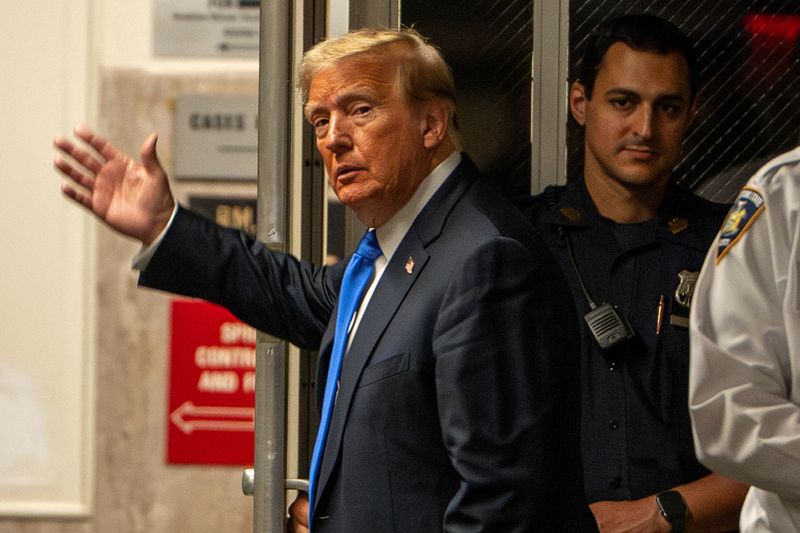
By Luc Cohen
NEW YORK (Reuters) - In their opening statement at Donald Trump’s criminal trial, the prosecutors seeking to win the first-ever criminal conviction of a sitting or former U.S. president made a bold prediction: they would have hard evidence to back up testimony from Michael Cohen, the star witness branded a liar by the defense.
Over the next several weeks, jurors heard testimony from insiders at Trump’s real estate company, his 2016 presidential campaign, and his White House that methodically backed up the two core elements of Manhattan District Alvin Bragg’s case: that Trump was aware of a “catch-and-kill” conspiracy to buy the silence of people with negative information before the election, and that he was involved in a cover-up of Cohen’s hush money payment to a porn star.
That testimony - coupled with evidence such as bank records, emails and a surreptitious recording of Trump speaking about a hush money payment - culminated in the 12-member jury finding Trump guilty of criminal charges.
Its verdict: He illegally falsified business records to hide his reimbursement to Cohen for the $130,000 Cohen paid to buy the silence of porn star Stormy Daniels before the 2016 election about an alleged sexual encounter she had with Trump in 2006.
To be sure, jury deliberations are secret and the reasoning behind the decision to convict will not be clear unless any jurors decide to speak publicly. Trump is almost certain to appeal his conviction.
Cohen testified at the trial in New York state criminal court in Manhattan that the reimbursement payments were falsely labeled as legal retainer fees in Trump’s family real estate company’s books. Cohen said Trump directed him to pay off Daniels, and that he would not have done so without getting paid back.
“He stated to me that he had spoken to some friends, some individuals, very smart people, and that: 'It's $130,000. You're like a billionaire. Just pay it,'” Cohen said on May 13. “And he expressed to me: 'Just do it.'”
The verdict vindicated Bragg, the Manhattan district attorney who was criticized by both Trump's fellow Republicans and some of Bragg's fellow Democrats for bringing a case involving well-known allegations of sexual impropriety, even if the transaction that mattered was financial.
Bragg argued the case was truly about an effort to corrupt the 2016 election - not sex.
"It was the subversion of democracy," prosecutor Joshua Steinglass said in his May 28 closing statement. The "catch-and-kill" conspiracy, he said, was meant "to manipulate and defraud the voters, to pull the wool over their eyes in a coordinated fashion."
The case is widely viewed as less consequential than the other three criminal cases Trump faces on charges over efforts to overturn his 2020 election loss to Democratic President Joe Biden and his retention of sensitive government documents after leaving the White House in 2021.
Trump has pleaded not guilty in the other three cases, which are unlikely to reach juries before his Nov. 5 election rematch with Biden.
'OUT OF CHARACTER’
One challenge for Bragg's case was Cohen's credibility. Cohen went to prison after pleading guilty in 2018 to violating campaign finance law with the payment to Daniels and lying to Congress in 2017 about a Trump Organization real estate project in Russia. Trump's lawyer Todd Blanche hounded Cohen on cross-examination about his lies to journalists and an instance in which he stole from Trump's company.
So prosecutors needed plenty of evidence backing up Cohen’s testimony that Trump was aware of Cohen’s payment to Daniels, which they argued was part of a broader conspiracy to buy the silence of people with potentially negative information about Trump in violation of campaign finance laws.
Jurors did not have to rely solely on Cohen’s testimony to accept that Trump intended to conceal that alleged conspiracy by labeling his 2017 payments to Cohen as legal retainer fees.
David Pecker, the then-publisher of the National Enquirer tabloid, testified that he agreed at an August 2015 meeting with Trump and Cohen to be the campaign’s “eyes and ears” for women coming forward with unflattering stories about Trump.
Jurors heard a tape Cohen surreptitiously recorded of Trump on Sept. 6, 2016, discussing a hush money payment Pecker’s company made to Karen McDougal, a Playboy model who says she had a year-long affair with Trump in 2006 and 2007. Trump denied having ever had a sexual relationship with her or with Daniels.
Jurors saw phone records showing Cohen had several calls with Trump and his bodyguard Keith Schiller - whom Cohen said would hand his phone to Trump - around the time of frantic negotiations with Daniels’ lawyer over the payment in October 2016.
In some of his most damning testimony, Cohen said he, Trump and then-Trump Organization Chief Financial Officer Allen Weisselberg discussed the repayment plan in a January 2017 meeting shortly before Trump’s inauguration as president.
Weisselberg, who is serving a five-month jail sentence after pleading guilty to perjury in a separate case, did not testify for either side at the trial. But jurors saw Weisselberg’s handwritten notes - jotted down on a copy of the wire transfer receipt for Cohen’s payment to Daniels’ lawyer - with instructions as to how Trump Organization controller Jeff McConney should pay Cohen. McConney testified that he understood the payments to be a reimbursement for Cohen, not legal fees.
Hope Hicks, a former communications aide of Trump’s, recalled Trump telling her that Cohen paid Daniels “out of the kindness of his own heart” - consistent with the defense’s efforts to distance Trump himself from the hush money deals.
But Hicks expressed skepticism of that claim.
“That,” Hicks testified on May 3, “would be out of character for Michael.”

(Reuters) - Contract signings for U.S. home purchases fell by the most in three years in April and the overall level of activity was the lowest since the onset of the COVID-19 pandemic in the spring of 2020, as high interest rates keep a lid on the housing market, the National Association of Realtors said on Thursday.
The NAR said its pending home sales index fell 7.7% in April to 72.3 from an upwardly revised 78.3 reading in March. The drop was the largest since February 2021 and the index level was the lowest since the record-low reading of 71.8 in April of 2020.
The index is meant to be predictive of completed home sales transactions one to two months later.
"The impact of escalating interest rates throughout April dampened home buying, even with more inventory in the market," said Lawrence Yun, the NAR's chief economist. "But the Federal Reserve's anticipated rate cut later this year should lead to better conditions, with improved affordability and more supply."
The Fed has raised interest rates by 5.25 percentage points since March 2020 to combat inflation. Rates have been on hold since last July and the year began with expectations for as many as three quarter-percentage-point rate cuts this year, but stiffer-than-expected inflation to start the year has changed the Fed's tone. Bond market pricing now reflects the likelihood of no more than two rate cuts this year.
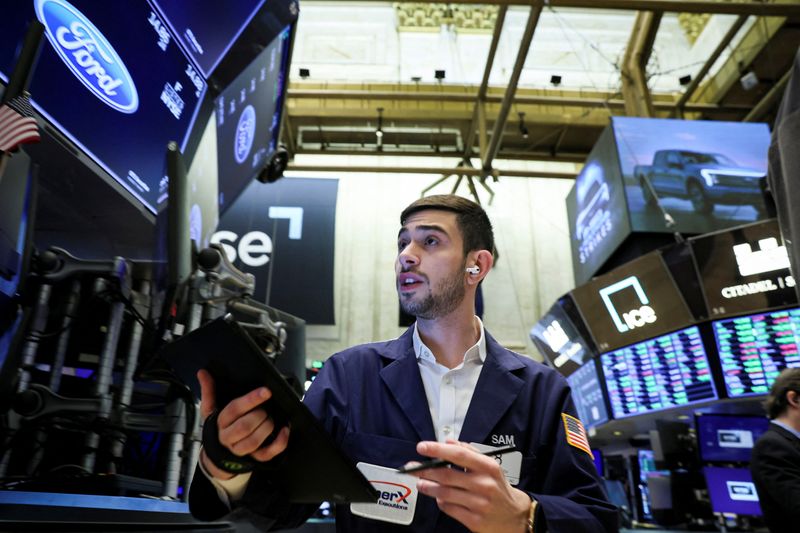
Investing.com -- U.S. futures inch lower on Thursday following a drop in equities in the previous session, with concerns rising over weak Treasury sales and the outlook for possible Federal Reserve interest rate reductions. Salesforce (NYSE:CRM) shares drop in extended hours dealmaking after the business software group's second-quarter misses estimates. Elsewhere, activist investor Nelson Peltz reportedly liquidates his stake in Disney after a failed proxy battle earlier this year.
1. Futures lower
U.S. stock futures slipped on Thursday, pointing to an extension in losses logged in the prior session, as investors fretted about a spike in Treasury yields and the timing of potential interest rate cuts by the Federal Reserve.
By 03:41 ET (07:41 GMT), the Dow futures contract had shed 334 points or 0.9%, S&P 500 futures had dipped by 27 points or 0.5%, and Nasdaq 100 futures had fallen by 110 points or 0.6%.
The main averages on Wall Street sank on Wednesday, pulled down by an uptick in Treasury yields sparked by tepid demand for new U.S. government debt auctions. The yield on the benchmark 10-year Treasury yield climbed to a four-week peak of 4.6%, adding to gains clocked on Tuesday.
Signs of sticky inflation and recent commentary from Fed officials have also led some market observers to ratchet down their expectations for rate reductions this year. Instead of two cuts in 2024, the closely-monitored CME FedWatch Tool shows that traders are now betting that the central bank will roll out just one in either November or December.
This sentiment could be further impacted by the release of the monthly personal consumption expenditures price index -- the Fed's preferred measure of inflation -- later this week. Policymakers have suggested that they need to see more evidence that price gains are cooling back to their 2% target level before they can start to lower borrowing costs down from more than two-decade highs.
2. Salesforce slumps after-hours as second-quarter forecast disappoints
Shares in Salesforce tumbled by more than 16% in extended hours trading after the workplace software group unveiled current-quarter guidance that fell short of analysts' estimates.
The outlook was impacted by weak client spending on its business-oriented products and services, denting optimism around the California-based company's plan to use generative artificial intelligence to boost returns. Chief Executive Marc Benioff struck a bullish tone on AI, however, saying that it continues to present a "massive opportunity for our customers to connect with their customers in a whole new way."
For its fiscal second quarter, Salesforce projected that adjusted per-share earnings would be in a range of $1.31 to $1.33 on revenue of between $9.20 billion and $9.25 billion. Wall Street forecasts had seen the figures at $1.47 and $9.34 billion, respectively.
The firm also slashed its expectations for annual subscription and support revenue growth down to "slightly below" 10% versus a year ago. It had previously forecast an increase of 10% in February.
In other corporate news, HP Inc's (NYSE:HPQ) second-quarter sales beat estimates, in a sign of improving strength in the personal computing market. Shares in the group were higher following the closing bell.
3. Peltz liquidates Disney stake - CNBC
Activist investor Nelson Peltz has offloaded his entire stake in Walt Disney Company (NYSE:NYSE:DIS), according to a CNBC report on Wednesday.
Peltz reportedly sold his Disney shares at approximately $120 each, a transaction that raked in roughly $1 billion. The stock closed at $100.88 on Wednesday, and has risen by more than 11% so far this year.
The move comes on the heels of Peltz's investment firm, Trian Partners, losing a proxy battle at a meeting of Disney shareholders in early April. During the gathering, stakeholders backed the re-election of the entertainment giant's full board of directors, rejecting Peltz's attempts to secure seats for himself and Jay Rasulo, Disney's former Chief Financial Officer.
Peltz has been a vocal critic of Disney's governance for some time, specifically hitting out at the company's strategy for its crucial streaming service as well as its succession plans for Chief Executive Bob Iger.
4. UBS reshuffles leadership team, considers CEO succession - FT
Swiss lender UBS has reshuffled its executive board and divided responsibility for its key wealth management segment between two managers who are considered to be the mostly likely successors to current Chief Executive Sergio Ermotti, the Financial Times has reported.
Citing a memo to staff sent from Ermotti, the FT reported that wealth management boss Iqbal Khan and investment bank head Rob Karofsky will become co-presidents of the wealth management unit. Under the plan, Khan will reportedly move to Asia to lead UBS's Asia-Pacific business, while Karofsky will helm its Americas division.
Meanwhile, the bank, which is in the process of assimilating its one-time rival Credit Suisse into its operations following a government-brokered tie-up last year, is seeking internal candidates to replace Ermotti after his expected retirement in 2027, the FT said.
The top-level shake-up will also see the departure of Credit Suisse CEO Ulrich Körner and the retirement of UBS Americas head Naureen Hassan, the paper reported. Körner will be the last chief executive in the 168-year history of Credit Suisse.
5. Crude declines despite U.S. inventory draw
Crude prices edged lower on Thursday, as worries over high borrowing costs outweighed optimism over a bigger-than-expected draw in U.S. inventories.
By 03:42 ET, the U.S. crude futures (WTI) traded 0.5% lower at $78.81 per barrel, while the Brent contract dropped 0.6% to $82.97 a barrel.
Data from the American Petroleum Institute showed on Wednesday that U.S. oil inventories shrank nearly 6.5 million barrels last week, much more than expectations for a draw of 1.9 million barrels.
The data usually heralds a similar reading from official inventory data, which is due later Thursday. The outsized draw suggested that U.S. fuel demand was picking up with the onset of the travel-heavy summer season, widely seen as the Memorial Day weekend.
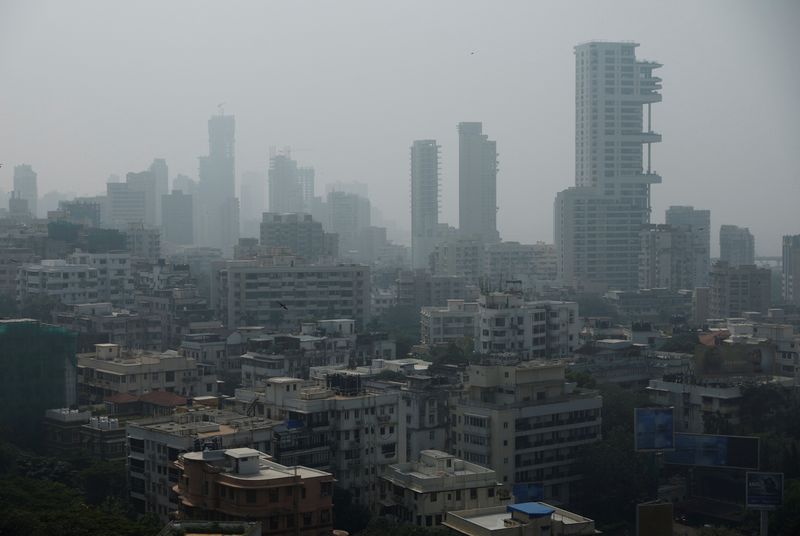
By Milounee Purohit
BENGALURU (Reuters) - Average home prices in India are expected to rise steadily over the next few years as the country's rich drive up demand for luxury housing, according to property experts polled by Reuters who also said there would be a shortage of affordable homes.
Home purchases are increasingly driven by a select few in a country of more than 1.4 billion people, mostly those unaffected by higher interest rates.
Economic growth in Asia's third-largest economy is expected to continue outpacing its major peers, driving demand for housing, even though economists argue the benefits of that growth are being skewed more towards the upper classes.
Average home prices are forecast to rise around 6% this year and next, slightly below the 7% expected in a March poll, according to the median forecast from a May 10-29 survey of 15 property market experts.
House prices rose 4.3% in 2023, according to Reuters calculations based on the Reserve Bank of India's House Price Index.
"Property prices are expected to maintain an upward trajectory...because of consistent demand and limited ready supply," said Ankita Sood, director and head of research at REA India. "The demand for high-value properties from investors and high-income individuals fuels this upward trend."
The luxury segment accounted for 15-16% of total sales before the pandemic but has risen to around 28%, Sood said.
Further rises in house prices will worsen affordability for first time buyers who are already struggling to save up the initial down payment.
The RBI, which raised interest rates by 250 basis points between May 2022 and February 2023 to cool inflation, is broadly expected to cut them next quarter, although a stable rupee and a strong economy leaves the central bank with little incentive to act.
That suggests relatively high mortgage rates are here to stay, adding to pressure on first-time buyers.
When asked what would happen to affordability for first-time purchasers over the coming year, seven analysts said it would improve and the remaining six said it would worsen.
CBRE's Atif Khan expects affordability to improve as income levels rise in tier I cities such as Mumbai and Delhi, but Colliers International's Ajay Sharma said a "flattening" of the jobs market would cause it to slip.
Finding affordable housing is a major challenge for the millions who flock to cities as India rapidly urbanises.
Despite government initiatives to build affordable homes, a strong majority of respondents, 12 of 15, said demand would not be met over the next two to three years. The other three forecast excess supply.
"Supply of affordable homes is affected by rising land prices (and) developers focusing on bigger ticket-size segments where sales momentum is quite robust," said Rohan Sharma, director at JLL Research.
(For other stories from the Reuters quarterly housing market polls:)
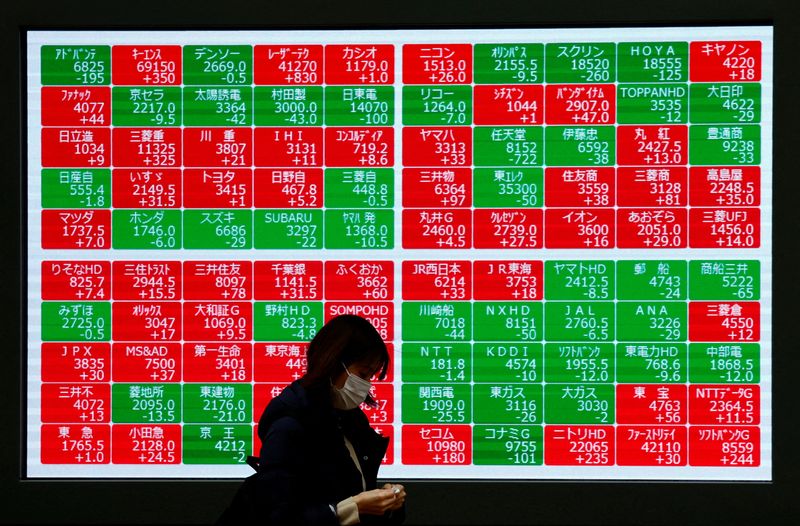
By Rae Wee
SINGAPORE (Reuters) - Asian stocks were a sea of red on Thursday and bonds slid on bets global interest rates would stay higher for longer, as investors looked to key inflation readings at the end of the week for further clues on the future path of monetary policy.
The dollar rode U.S. Treasury yields higher while gold remained under pressure on renewed expectations that the Federal Reserve is unlikely to cut rates any time soon.
The latest halt in the global risk rally has come on the back of data pointing to lingering inflationary pressures across major economies.
"Hotter and stickier than expected global inflation appears to be taking the air out of asset markets," said Vishnu Varathan, chief economist for Asia ex-Japan at Mizuho Bank. "Equities slid and bonds swooned, and USD swaggered."
MSCI's broadest index of Asia-Pacific shares outside Japan fell 0.5%, tracking a negative lead from Wall Street and extending its 1.6% decline from the previous session.
Japan's Nikkei tumbled more than 1.5%, while U.S. and European futures similarly fell. EUROSTOXX 50 futures eased 0.18% while S&P 500 futures dipped 0.35%.
Nasdaq futures slumped 0.45%.
A Fed survey on Wednesday showed U.S. economic activity continued to expand from early April through mid-May but firms grew more pessimistic about the future while inflation increased at a modest pace.
Across the Atlantic, data the same day showed German inflation rose slightly more than forecast to 2.8% in May, ahead of the wider euro zone bloc's reading on Friday.
The main highlight of the week for markets, however, is Friday's U.S. core personal consumption expenditures (PCE) price index report - the Federal Reserve's preferred measure of inflation. Expectations are for it to hold steady on a monthly basis.
"If we look at data that has led us to this point, I have a hard time believing a softer-than-expected PCE report will arrive on Friday," said Matt Simpson, senior market analyst at City Index.
"From this perspective, PCE not ticking higher could be a welcome surprise. But should it heat up further from sticky levels, appetite for risk will be taken out the back for a good kicking."
U.S. Treasury yields meanwhile stayed elevated on Thursday, in part due to a weak debt auction the previous day. The benchmark 10-year yield was last at 4.6197%, while the two-year yield steadied at 4.9830%.
Bond yields move inversely to prices.
Japanese government bond (JGB) yields similarly notched fresh multi-year peaks, on growing expectations that further rate hikes from the Bank of Japan could be imminent.
The 10-year JGB yield peaked at 1.1% in early Asia trade, its highest since July 2011.
Elsewhere in Asia, Chinese blue chips eased 0.25%, tracking its regional peers despite the International Monetary Fund's upgrade to China's 2024 and 2025 GDP growth forecasts.
Hong Kong's Hang Seng Index tacked on 0.17%.
DOLLAR REIGN
In the currency market, the dollar was on the front foot, knocking the euro to an over two-week low of $1.07955.
The yen last stood at 157.43 per dollar, after having slid to a four-week low of 157.715 in the previous session.
The Australian dollar edged 0.1% higher to $0.6617, after a brief lift in the previous session on data which showed domestic inflation unexpectedly picked up to a five-month high in April.
"This was not the inflation report the Reserve Bank of Australia would have wanted to see," said Rob Carnell, ING's regional head of research for Asia Pacific.
Oil prices rose slightly, recovering some lost ground from Wednesday on worries over weak U.S. gasoline demand and higher-for-longer interest rates.
Brent steadied at $83.60 per barrel while U.S. crude ticked 0.03% higher to $79.25 a barrel. [O/R]
Spot gold fell 0.2% to $2,334.15 an ounce. [GOL/]

